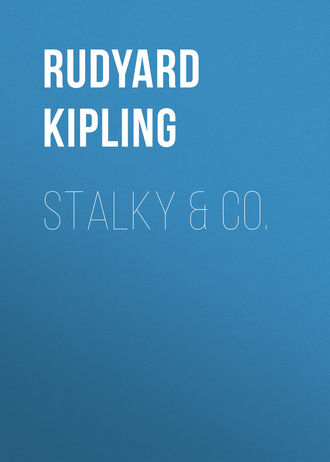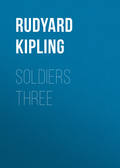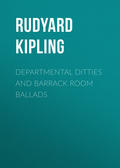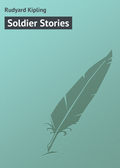
Редьярд Джозеф Киплинг
Stalky & Co.
“Aves?” said Beetle.
“Of course, but I’m not smokin’ aujourd’hui. Parceque je jolly well pense that we’ll be suivi. We’ll go along the cliffs, slow, an’ give Foxy lots of time to parallel us up above.”
They strolled towards the swimming-baths, and presently overtook King. “Oh, don’t let me interrupt you,” he said. “Engaged in scientific pursuits, of course? I trust you will enjoy yourselves, my young friends.”
“You see!” said Stalky, when they were out of earshot. “He can’t keep a secret. He’s followin’ to cut off our line of retreat. He’ll wait at the baths till Heffy comes along. They’ve tried every blessed place except along the cliffs, and now they think they’ve bottled us. No need to hurry.”
They walked leisurely over the combes till they reached the line of notice-boards.
“Listen a shake. Foxy’s up wind comin’ down hill like beans. When you hear him move in the bushes, go straight across to Aves. They want to catch us flagrante delicto.”
They dived into the gorse at right angles to the tunnel, openly crossing the grass, and lay still in Aves.
“What did I tell you?” Stalky carefully put away the pipes and tobacco. The Sergeant, out of breath, was leaning against the fence, raking the furze with his binoculars, but he might as well have tried to see through a sand-bag. Anon, Prout and King appeared behind him. They conferred.
“Aha! Foxy don’t like the notice-boards, and he don’t like the prickles either. Now we’ll cut up the tunnel and go to the Lodge. Hullo! They’ve sent Foxy into cover.”
The Sergeant was waist-deep in crackling, swaying furze, his ears filled with the noise of his own progress. The boys reached the shelter of the wood and looked down through a belt of hollies.
“Hellish noise!” said Stalky, critically. “‘Don’t think Colonel Dabney will like it. I move we go into the Lodge and get something to eat. We might as well see the fun out.”
Suddenly the keeper passed them at a trot. “Who’m they to combe-bottom for Lard’s sake? Master’ll be crazy,” he said.
“Poachers simly,” Stalky replied in the broad Devon that was the boy’s langue de guerre.
“I’ll poach ‘em to raights!” He dropped into the funnel-like combe, which presently began to fill with noises, notably King’s voice crying: “Go on, Sergeant! Leave him alone, you, sir. He is executing my orders.”
“Who’m yeou to give arders here, gingy whiskers? Yeou come up to the master. Come out o’ that wuzzy! [This is to the Sergeant.] Yiss, I reckon us knows the boys yeou’m after. They’ve tu long ears an’ vuzzy bellies, an’ you nippies they in yeour pockets when they’m dead. Come on up to master! He’ll boy yeou all you’re a mind to. Yeou other folk bide your side fence.”
“Explain to the proprietor. You can explain, Sergeant,” shouted King. Evidently the Sergeant had surrendered to the major force.
Beetle lay at full length on the turf behind the Lodge, literally biting the earth in spasms of joy. Stalky kicked him upright. There was nothing of levity about Stalky or McTurk save a stray muscle twitching on the cheek.
They tapped at the Lodge door, where they were always welcome. “Come yeou right in an’ set down, my little dearrs,” said the woman. “They’ll niver touch my man. He’ll poach ‘em to rights. Iss fai! Fresh berries an’ cream. Us Dartymoor folk niver forgit their friends. But them Bidevor poachers, they’ve no hem to their garments. Sugar? My man he’ve digged a badger for yeou, my dearrs. ‘Tis in the linhay in a box.”
“Us’ll take un with us when we’re finished here. I reckon yeou’m busy. We’ll bide here an’ – ‘tis washin’ day with yeou, simly,” said Stalky. “We’m no company to make all vitty for. Never yeou mind us. Yiss. There’s plenty cream.”
The woman withdrew, wiping her pink hands on her apron, and left them in the parlor. There was a scuffle of feet on the gravel outside the heavily-leaded diamond panes, and then the voice of Colonel Dabney, something clearer than a bugle.
“Ye can read? You’ve eyes in your head? Don’t attempt to deny it. Ye have!”
Beetle snatched a crochet-work antimacassar from the shiny horsehair sofa, stuffed it into his mouth, and rolled out of sight.
“You saw my notice-boards. Your duty? Curse your impudence, sir. Your duty was to keep off my grounds. Talk of duty to me! Why – why – why, ye misbegotten poacher, ye’ll be teaching me my A B C next! Roarin’ like a bull in the bushes down there! Boys? Boys? Boys? Keep your boys at home, then! I’m not responsible for your boys! But I don’t believe it – I don’t believe a word of it. Ye’ve a furtive look in your eye – a furtive, sneakin’, poachin’ look in your eye, that ‘ud ruin the reputation of an archangel! Don’t attempt to deny it! Ye have! A sergeant? More shame to you, then, an’ the worst bargain Her Majesty ever made! A sergeant, to run about the country poachin’ – on your pension! Damnable! Oh, damnable! But I’ll be considerate. I’ll be merciful. By gad, I’ll be the very essence o’ humanity! Did ye, or did ye not, see my notice-boards? Don’t attempt to deny it! Ye did. Silence, Sergeant!”
Twenty-one years in the army had left their mark on Foxy. He obeyed.
“Now. March!” The high Lodge gate shut with a clang. “My duty! A sergeant to tell me my duty!” puffed Colonel Dabney. “Good Lard! more sergeants!”
“It’s King! It’s King!” gulped Stalky, his head on the horsehair pillow. McTurk was eating the rag-carpet before the speckless hearth, and the sofa heaved to the emotions of Beetle. Through the thick glass the figures without showed blue, distorted, and menacing.
“I – I protest against this outrage.” King had evidently been running up hill. “The man was entirely within his duty. Let – let me give you my card.”
“He’s in flannels!” Stalky buried his head again.
“Unfortunately – most unfortunately – I have not one with me, but my name is King, sir, a house-master of the College, and you will find me prepared – fully prepared – to answer for this man’s action. We’ve seen three – ”
“Did ye see my notice-boards?”
“I admit we did; but under the circumstances – ”
“I stand in loco parentis.” Prout’s deep voice was added to the discussion. They could hear him pant.
“F’what?” Colonel Dabney was growing more and more Irish.
“I’m responsible for the boys under my charge.”
“Ye are, are ye? Then all I can say is that ye set them a very bad example – a dam’ bad example, if I may say so. I do not own your boys. I’ve not seen your boys, an’ I tell you that if there was a boy grinnin’ in every bush on the place, still ye’ve no shadow of a right here, comin’ up from the combe that way, an’ frightenin’ everything in it. Don’t attempt to deny it. Ye did. Ye should have come to the Lodge an’ seen me like Christians, instead of chasin’ your dam’ boys through the length and breadth of my covers. In loco parentis ye are? Well, I’ve not forgotten my Latin either, an’ I’ll say to you: ‘Quis custodiet ipsos custodes.’ If the masters trespass, how can we blame the boys?”
“But if I could speak to you privately,” said Prout.
“I’ll have nothing private with you! Ye can be as private as ye please on the other side o’ that gate an’ – I wish ye a very good afternoon.”
A second time the gate clanged. They waited till Colonel Dabney had returned to the house, and fell into one another’s arms, crowing for breath.
“Oh, my Soul! Oh, my King! Oh, my Heffy! Oh, my Foxy! Zeal, all zeal, Mr. Simple.” Stalky wiped his eyes. “Oh! Oh I Oh! – ‘I did boil the exciseman!’ We must get out of this or we’ll be late for tea.”
“Ge – Ge – get the badger and make little Hartopp happy. Ma – ma – make ‘em all happy,” sobbed McTurk, groping for the door and kicking the prostrate Beetle before him.
They found the beast in an evil-smelling box, left two half-crowns for payment, and staggered home. Only the badger grunted most marvelous like Colonel Dabney, and they dropped him twice or thrice with shrieks of helpless laughter. They were but imperfectly recovered when Foxy met them by the Fives Court with word that they were to go up to their dormitory and wait till sent for.
“Well, take this box to Mr. Hartopp’s rooms, then. We’ve done something for the Natural History Society, at any rate,” said Beetle.
“‘Fraid that won’t save you, young gen’elmen,” Foxy answered, in an awful voice. He was sorely ruffled in his mind.
“All sereno, Foxibus.” Stalky had reached the extreme stage of hiccups. “We – we’ll never desert you, Foxy. Hounds choppin’ foxes in cover is more a proof of vice, ain’t it?.. No, you’re right. I’m – I’m not quite well.”
“They’ve gone a bit too far this time,” Foxy thought to himself. “Very far gone, I’d say, excep’ there was no smell of liquor. An’ yet it isn’t like ‘em – somehow. King and Prout they ‘ad their dressin’-down same as me. That’s one comfort.”
“Now, we must pull up,” said Stalky, rising from the bed on which he had thrown himself. “We’re injured innocence – as usual. We don’t know what we’ve been sent up here for, do we?”
“No explanation. Deprived of tea. Public disgrace before the house,” said McTurk, whose eyes were running over. “It’s dam’ serious.”
“Well, hold on, till King loses his temper,” said Beetle. “He’s a libelous old rip, an’ he’ll be in a ravin’ paddy-wack. Prout’s too beastly cautious. Keep your eye on King, and, if he gives us a chance, appeal to the Head. That always makes ‘em sick.”
They were summoned to their house-master’s study, King and Foxy supporting Prout, and Foxy had three canes under his arm. King leered triumphantly, for there were tears, undried tears of mirth, on the boys’ cheeks. Then the examination began.
Yes, they had walked along the cliffs. Yes, they had entered Colonel Dabney’s grounds. Yes, they had seen the notice-boards (at this point Beetle sputtered hysterically). For what purpose had they entered Colonel Dabney’s grounds? “Well, sir, there was a badger.”
Here King, who loathed the Natural History Society because he did not like Hartopp, could no longer be restrained. He begged them not to add mendacity to open insolence. But the badger was in Mr. Hartopp’s rooms, sir. The Sergeant had kindly taken it up for them. That disposed of the badger, and the temporary check brought King’s temper to boiling-point. They could hear his foot on the floor while Prout prepared his lumbering inquiries. They had settled into their stride now. Their eyes ceased to sparkle; their faces were blank; their hands hung beside them without a twitch. They were learning, at the expense of a fellow-countryman, the lesson of their race, which is to put away all emotion and entrap the alien at the proper time.
So far good. King was importing himself more freely into the trial, being vengeful where Prout was grieved. They knew the penalties of trespassing? With a fine show of irresolution, Stalky admitted that he had gathered some information vaguely bearing on this head, but he thought – The sentence was dragged out to the uttermost: Stalky did not wish to play his trump with such an opponent. Mr. King desired no buts, nor was he interested in Stalky’s evasions. They, on the other hand, might be interested in his poor views. Boys who crept – who sneaked – who lurked – out of bounds, even the generous bounds of the Natural History Society, which they had falsely joined as a cloak for their misdeeds – their vices – their villainies – their immoralities —
“He’ll break cover in a minute,” said Stalky to himself. “Then we’ll run into him before he gets away.”
Such boys, scabrous boys, moral lepers – the current of his words was carrying King off his feet – evil-speakers, liars, slow-bellies – yea, incipient drunkards…
He was merely working up to a peroration, and the boys knew it; but McTurk cut through the frothing sentence, the others echoing:
“I appeal to the Head, sir.”
“I appeal to the head, sir.”
“I appeal to the Head, sir.”
It was their unquestioned right. Drunkenness meant expulsion after a public flogging. They had been accused of it. The case was the Head’s, and the Head’s alone.
“Thou hast appealed unto Caesar: unto Caesar shalt thou go.” They had heard that sentence once or twice before in their careers. “None the less,” said King, uneasily, “you would be better advised to abide by our decision, my young friends.”
“Are we allowed to associate with the rest of the school till we see the Head, sir?” said McTurk to his house-master, disregarding King. This at once lifted the situation to its loftiest plane. Moreover, it meant no work, for moral leprosy was strictly quarantined, and the Head never executed judgment till twenty-four cold hours later.
“Well – er – if you persist in your defiant attitude,” said King, with a loving look at the canes under Foxy’s arm. “There is no alternative.”
Ten minutes later the news was over the whole school. Stalky and Co. had fallen at last – fallen by drink. They had been drinking. They had returned blind-drunk from a hut. They were even now lying hopelessly intoxicated on the dormitory floor. A few bold spirits crept up to look, and received boots about the head from the criminals.
“We’ve got him – got him on the Caudine Toasting-fork!” said Stalky, after those hints were taken. “King’ll have to prove his charges up to the giddy hilt.”
“Too much ticklee, him bust,” Beetle quoted from a book of his reading. “Didn’t I say he’d go pop if we lat un bide?”
“No prep., either, O ye incipient drunkards,” said McTurk, “and it’s trig night, too. Hullo! Here’s our dear friend Foxy. More tortures, Foxibus?”
“I’ve brought you something to eat, young gentlemen,” said the Sergeant from behind a crowded tray. Their wars had ever been waged without malice, and a suspicion floated in Foxy’s mind that boys who allowed themselves to be tracked so easily might, perhaps, hold something in reserve. Foxy had served through the Mutiny, when early and accurate information was worth much.
“I – I noticed you ‘adn’t ‘ad anything to eat, an’ I spoke to Gumbly, an’ he said you wasn’t exactly cut off from supplies. So I brought up this. It’s your potted ‘am tin, ain’t it, Mr. Corkran?”
“Why, Foxibus, you’re a brick,” said Stalky. “I didn’t think you had this much – what’s the word, Beetle?”
“Bowels,” Beetle replied, promptly. “Thank you, Sergeant. That’s young Carter’s potted ham, though.”
“There was a C on it. I thought it was Mr. Corkran’s. This is a very serious business, young gentlemen. That’s what it is. I didn’t know, perhaps, but there might be something on your side which you hadn’t said to Mr. King or Mr. Prout, maybe.”
“There is. Heaps, Foxibus.” This from Stalky through a full mouth.
“Then you see, if that was the case, it seemed to me I might represent it, quiet so to say, to the ‘Ead when he asks me about it. I’ve got to take ‘im the charges to-night, an’ – it looks bad on the face of it.”
“‘Trocious bad, Foxy. Twenty-seven cuts in the Gym before all the school, and public expulsion. ‘Wine is a mocker, strong drink is ragin’,’” quoth Beetle.
“It’s nothin’ to make fun of, young gentlemen. I ‘ave to go to the ‘Ead with the charges. An’ – an’ you mayn’t be aware, per’aps, that I was followin’ you this afternoon; havin’ my suspicions.”
“Did ye see the notice-boards?” croaked McTurk, in the very brogue of Colonel Dabney.
“Ye’ve eyes in your head. Don’t attempt to deny it. Ye did!” said Beetle.
“A sergeant! To run about poachin’ on your pension! Damnable, O damnable!” said Stalky, without pity.
“Good Lord!” said the Sergeant, sitting heavily upon a bed. “Where – where the devil was you? I might ha’ known it was a do – somewhere.”
“Oh, you clever maniac!” Stalky resumed. “We mayn’t be aware you were followin’ us this afternoon, mayn’t we? ‘Thought you were stalkin’ us, eh? Why, we led you bung into it, of course. Colonel Dabney – don’t you think he’s a nice man, Foxy? – Colonel Dabney’s our pet particular friend. We’ve been goin’ there for weeks and weeks, he invited us. You and your duty! Curse your duty, sir! Your duty was to keep off his covers.”
“You’ll never be able to hold up your head again, Foxy. The fags ‘ll hoot at you,” said Beetle.
“Think of your giddy prestige!” The Sergeant was thinking – hard.
“Look ‘ere, young gentlemen,” he said, earnestly. “You aren’t surely ever goin’ to tell, are you? Wasn’t Mr. Prout and Mr. King in – in it too?”
“Foxibusculus, they was. They was – singular horrid. Caught it worse than you. We heard every word of it. You got off easy, considerin’. If I’d been Dabney I swear I’d ha’ quodded you. I think I’ll suggest it to him to-morrow.”
“An’ it’s all goin’ up to the ‘Ead. Oh, Good Lord!”
“Every giddy word of it, my Chingangook,” said Beetle, dancing. “Why shouldn’t it? We’ve done nothing wrong. We ain’t poachers. We didn’t cut about blastin’ the characters of poor, innocent boys – saying they were drunk.”
“That I didn’t,” said Foxy. “I – I only said that you be’aved uncommon odd when you come back with that badger. Mr. King may have taken the wrong hint from that.”
“‘Course he did; an’ he’ll jolly well shove all the blame on you when he finds out he’s wrong. We know King, if you don’t. I’m ashamed of you. You ain’t fit to be a sergeant,” said McTurk.
“Not with three thorough-goin’ young devils like you, I ain’t. I’ve been had. I’ve been ambuscaded. Horse, foot, an’ guns, I’ve been had, an’ – an’ there’ll be no holdin’ the junior forms after this. M’rover, the ‘Ead will send me with a note to Colonel Dabney to ask if what you say about bein’ invited was true.”
“Then you’d better go in by the Lodge-gates this time, instead of chasin’ your dam’ boys – oh, that was the Epistle to King – so it was. We-el, Foxy?” Stalky put his chin on his hands and regarded the victim with deep delight.
“Ti-ra-la-la-i-tu! I gloat! Hear me!” said McTurk. “Foxy brought us tea when we were moral lepers. Foxy has a heart. Foxy has been in the Army, too.”
“I wish I’d ha’ had you in my company, young gentlemen,” said the Sergeant from the depths of his heart; “I’d ha’ given you something.”
“Silence at drum-head court-martial,” McTurk went on. “I’m advocate for the prisoner; and, besides, this is much too good to tell all the other brutes in the Coll. They’d never understand. They play cricket, and say: ‘Yes sir,’ and ‘O, sir,’ and ‘No, sir.’”
“Never mind that. Go ahead,” said Stalky.
“Well, Foxy’s a good little chap when he does not esteem himself so as to be clever.”
“‘Take not out your ‘ounds on a werry windy day,’” Stalky struck in. “I don’t care if you let him off.”
“Nor me,” said Beetle. “Heffy is my only joy – Heffy and King.”
“I ‘ad to do it,” said the Sergeant, plaintively.
“Right, O! Led away by bad companions in the execution of his duty or – or words to that effect. You’re dismissed with a reprimand, Foxy. We won’t tell about you. I swear we won’t,” McTurk concluded. “Bad for the discipline of the school. Horrid bad.”
“Well,” said the Sergeant, gathering up the tea-things, “knowin’ what I know o’ the young dev – gentlemen of the College, I’m very glad to ‘ear it. But what am I to tell the ‘Ead?”
“Anything you jolly well please, Foxy. We aren’t the criminals.”
To say that the Head was annoyed when the Sergeant appeared after dinner with the day’s crime-sheet would be putting it mildly.
“Corkran, McTurk, and Co., I see. Bounds as usual. Hullo! What the deuce is this? Suspicion of drinking. Whose charge??”
“Mr. King’s, sir. I caught ‘em out of bounds, sir: at least that was ‘ow it looked. But there’s a lot be’ind, sir.” The Sergeant was evidently troubled.
“Go on,” said the Head. “Let us have your version.” He and the Sergeant had dealt with one another for some seven years; and the Head knew that Mr. King’s statements depended very largely on Mr. King’s temper.
“I thought they were out of bounds along the cliffs. But it come out they wasn’t, sir. I saw them go into Colonel Dabney’s woods, and – Mr. King and Mr. Prout come along – and the fact was, sir, we was mistook for poachers by Colonel Dabney’s people – Mr. King and Mr. Prout and me. There were some words, sir, on both sides. The young gentlemen slipped ‘ome somehow, and they seemed ‘ighly humorous, sir. Mr. King was mistook by Colonel Dabney himself – Colonel Dabney bein’ strict. Then they preferred to come straight to you, sir, on account of what – what Mr. King may ‘ave said about their ‘abits afterwards in Mr. Prout’s study. I only said they was ‘ighly humorous, laughin’ an’ gigglin’, an’ a bit above ‘emselves. They’ve since told me, sir, in a humorous way, that they was invited by Colonel Dabney to go into ‘is woods.”
“I see. They didn’t tell their house-master that, of course?”
“They took up Mr. King on appeal just as soon as he spoke about their – ‘abits. Put in the appeal at once, sir, an’ asked to be sent to the dormitory waitin’ for you. I’ve since gathered, sir, in their humorous way, sir, that some’ow or other they’ve ‘eard about every word Colonel Dabney said to Mr. King and Mr. Prout when he mistook ‘em for poachers. I – I might ha’ known when they led me on so that they ‘eld the inner line of communications. It’s – it’s a plain do, sir, if you ask me; an’ they’re gloatin’ over it in the dormitory.”
The Head saw – saw even to the uttermost farthing – and his mouth twitched a little under his mustache.
“Send them to me at once, Sergeant. This case needn’t wait over.”
“Good evening,” said he when the three appeared under escort. “I want your undivided attention for a few minutes. You’ve known me for five years, and I’ve known you for – twenty-five. I think we understand one another perfectly. I am now going to pay you a tremendous compliment (the brown one, please, Sergeant. Thanks. You needn’t wait). I’m going to execute you without rhyme, Beetle, or reason. I know you went to Colonel Dabney’s covers because you were invited. I’m not even going to send the Sergeant with a note to ask if your statement is true; because I am convinced that on this occasion you have adhered strictly to the truth. I know, too, that you were not drinking. (You can take off that virtuous expression, McTurk, or I shall begin to fear you don’t understand me.) There is not a flaw in any of your characters. And that is why I am going to perpetrate a howling injustice. Your reputations have been injured, haven’t they? You have been disgraced before the house, haven’t you? You have a peculiarly keen regard for the honor of your house, haven’t you? Well, now I am going to lick you.”
Six apiece was their portion upon that word.
“And this I think” – the Head replaced the cane, and flung the written charge into the waste-paper basket – “covers the situation. When you find a variation from the normal – this will be useful to you in later life – always meet him in an abnormal way. And that reminds me. There are a pile of paper-backs on that shelf. You can borrow them if you put them back. I don’t think they’ll take any harm from being read in the open. They smell of tobacco rather. You will go to prep. this evening as usual. Good-night,” said that amazing man.
“Good-night, and thank you, sir.”
“I swear I’ll pray for the Head to-night,” said Beetle. “Those last two cuts were just flicks on my collar. There’s a ‘Monte Cristo’ in that lower shelf. I saw it. Bags I, next time we go to Aves!”
“Dearr man!” said McTurk. “No gating. No impots. No beastly questions. All settled. Hullo! what’s King goin’ in to him for – King and Prout?”
Whatever the nature of that interview, it did not improve either King’s or Prout’s ruffled plumes, for, when they came out of the Head’s house, eyes noted that the one was red and blue with emotion as to his nose, and that the other was sweating profusely. That sight compensated them amply for the Imperial Jaw with which they were favored by the two. It seems – and who so astonished as they? – that they had held back material facts; were guilty both of suppressio veri and suggestio falsi (well-known gods against whom they often offended); further, that they were malignant in their dispositions, untrustworthy in their characters, pernicious and revolutionary in their influences, abandoned to the devils of wilfulness, pride, and a most intolerable conceit. Ninthly, and lastly, they were to have a care and to be very careful.
They were careful, as only boys can be when there is a hurt to be inflicted. They waited through one suffocating week till Prout and King were their royal selves again; waited till there was a house-match – their own house, too – in which Prout was taking part; waited, further, till he had his pads in the pavilion and stood ready to go forth. King was scoring at the window, and the three sat on a bench without.
Said Stalky to Beetle: “I say, Beetle, quis custodet ipsos custodes?”
“Don’t ask me,” said Beetle. “I’ll have nothin’ private with you. Ye can be as private as ye please the other end of the bench; and I wish ye a very good afternoon.”
McTurk yawned.
“Well, ye should ha’ come up to the lodge like Christians instead o’ chasin’ your – a-hem – boys through the length an’ breadth of my covers. I think these house-matches are all rot. Let’s go over to Colonel Dabney’s an’ see if he’s collared any more poachers.”
That afternoon there was joy in Aves.







